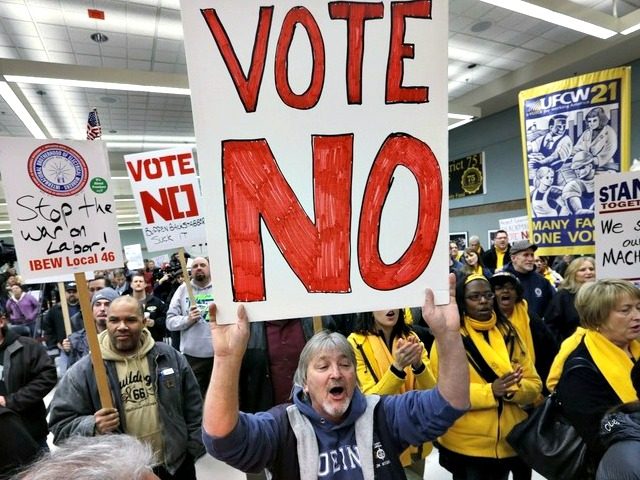Reintroduced by Sen. Orrin Hatch (R-UT) and Rep. Tom Price (R-GA) to protect employees from union intimidation, the Employee Rights Act (ERA) aims to substantially update American labor law for the first time since the 1940s.
But it has left union bosses—desperate to maintain their stranglehold on the workplace—shouting ridiculous things like the ERA is an “attack on democracy” and just “more corporate welfare.”
Why are they so scared? Well, the bill would:
- Guarantee secret ballot elections for employees when considering union representation. Union bosses can currently scrap the private vote procedure in favor of confrontational “requests” to sign unionization authorization contracts. Labor organizers have publicly stated that winning secret ballot elections are more difficult than the intimidating election equivalent of a public card signing process—so-called “card checks.”
- Rein in Big Labor’s political spendingby requiring union bosses to obtain opt-in permission from membership before spending dues money on politics. From 2012 to 2014, Big Labor sent almost $420 million of union member dues to the Democratic Party and closely aligned liberal special interest groups—even though roughly 40 percent of union members vote Republican.
- Force union bosses to face re-election by guaranteeing re-votes.Less than 10 percent of union members ever voted for the union currently “representing” them, in part because union workplaces are not required to undergo a periodic re-certification process. Employees are currently left with only one difficult path to get a second vote once a workplace is unionized—even when it experiences substantial turnover.
- Criminalize union violence at the federal level. Yeah, that’s right: The federal government does not consider union violence a criminal offense as long as it’s in the pursuit of a legitimate union objective. Labor organizers often resort to bullying and other forms of intimidation to unethically pressure employees into union membership against their will.
- Update union elections to reflect the majority of all employees, not just the committed few who turn out to vote. Under current labor law, a workplace can become unionized even if some employees can’t participate. Some workplaces have been organized with less than half of all affected voters turning out.
The ERA would update labor law with eight pro-employee reforms, holding union bosses accountable to their membership. That’s left Big Labor—comfortable with the status quo—absolutely terrified. For more information, visit EmployeeRightsAct.com.

COMMENTS
Please let us know if you're having issues with commenting.